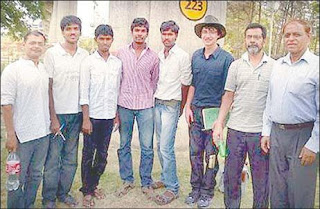Yesterday, I went to Mahagan Mall with my friend Mahesh. We bought subway sandwiches, books, a dress for his baby niece, which we will be returning today or tomorrow to get another one. Other than beef, the Subway has most of the kinds of sandwiches you can get in America plus some local varieties. One of things that caught my eye was the chicken ham. I was trying to figure out if they mixed chicken and pork to make it.
I got a turkey sub and later a chicken ham sub, and Mahesh had a local style chicken sub. Though they say 6-inch and footlong, the important part is the centimeter conversion below (I have a lot of fun trying to convert measurements I use to describe things into metric). Though the Subway's soda fountain was out, I was able to get drinks in the food dealer next to it. Of course, the regular size was what an American would call small, so I got myself their large.
During the meal, Mahesh was kind of disappointed that he could not completely taste the chicken because of all the vegetables. When I was half way done with my 6-inch sub, I could hold it in one hand while I have my soda in another. Mahesh did not have this skill and held his sub badly, using two hands just to keep things from falling out. I taught him to hold it at an angle so that the closed side of the sub bread is facing down. This allowed him to sit up straight without leaning in to close the distance between his sub and his mouth.
Everyday, my body yearns for food like Subway sandwiches, but when I get home, I look forward to sharing some Indian food and how to eat it.
I got a turkey sub and later a chicken ham sub, and Mahesh had a local style chicken sub. Though they say 6-inch and footlong, the important part is the centimeter conversion below (I have a lot of fun trying to convert measurements I use to describe things into metric). Though the Subway's soda fountain was out, I was able to get drinks in the food dealer next to it. Of course, the regular size was what an American would call small, so I got myself their large.
During the meal, Mahesh was kind of disappointed that he could not completely taste the chicken because of all the vegetables. When I was half way done with my 6-inch sub, I could hold it in one hand while I have my soda in another. Mahesh did not have this skill and held his sub badly, using two hands just to keep things from falling out. I taught him to hold it at an angle so that the closed side of the sub bread is facing down. This allowed him to sit up straight without leaning in to close the distance between his sub and his mouth.
Everyday, my body yearns for food like Subway sandwiches, but when I get home, I look forward to sharing some Indian food and how to eat it.











